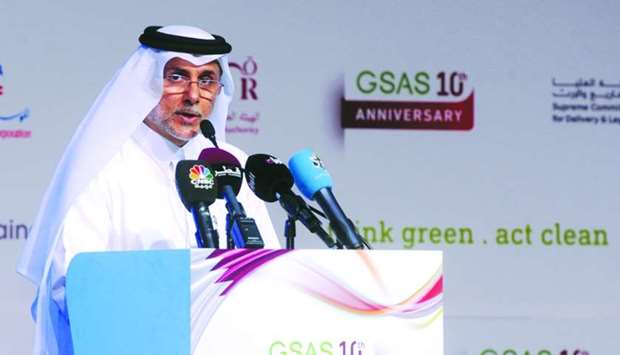“If at the level of cities and urban plans, the total area of projects exceeds 1.5bn sq ft, for buildings, the total area is estimated at more than 100mn sq ft,” said Dr Yousef al-Horr, founding chairman of Qatar-based Gulf Organisation for Research and Development (Gord).
Speaking at the opening session of the two-day Sustainability Summit 2017 in Doha on Sunday, he explained that as for the estimated value of the investments in the green projects for the GSAS certification, it will increase to half a trillion Qatari riyals.
"The projects include all 2022 FIFA World Cup stadiums; all railway stations; all public works projects such as schools, health centres, mosques and administrative establishments; all the facilities of Hamad International Port; the city of Lusail and the economic zones and their facilities of all kinds among others,” explained Dr al-Horr.
The official also noted that more than 5,000 people from around the world have been trained by Gord and some 2,000 certified professionals have been licensed as GSAS practitioners.
“In recognition of its responsibility for sustainable development, the country's largest institutions have rapidly adopted sustainability practices in accordance with the GSAS standards. They require minimum levels equivalent to or more than 30% of energy and water saving for any new building at the design stage compared to conventional buildings, which in turn will reduce carbon emissions by additional proportions,” highlighted the official.
Dr al-Horr pointed out that Gord in co-operation with the Supreme Committee for Delivery & Legacy (SC), has established the Gulf Carbon Trust (GCT) to encourage organisations and bodies to reduce their carbon footprint and in particular to work with the SC to achieve its vision to organise carbon neutral tournament in 2022.
GCT has already received membership of the International Emissions Trading Association. GCT will develop performance standards for projects aimed at reducing carbon emissions, then evaluate these projects according to approved standards, and issue carbon credits that will be used later for acquiring carbon finance in accordance with a specific mechanism following global practices.
Dr al-Horr also stated that with the support of SC and Qatar National Research Fund, Gord has developed a break-through energy-saving air-conditioning system.
“This effort achieved a patent of an innovative system suitable for climatic and environmental conditions of the region. During the tested period, the system has shown up to 50% reduction in energy consumption compared to conventional systems. The system reached the stage of technical maturity, allowing manufacture and commercialisation, which prompted us to sign an agreement to study the possibility of establishing a plant in Qatar,” he revealed.
According to the official, GSAS, set up in 2007, has derived best practices and standards appropriate for local environmental conditions and climate. “After ten years of hard work, GSAS is the most comprehensive assessment system for sustainability of built environment, covering built environment from the level of urban planning and infrastructure through design and construction to the operation and management,” he added.

Gord's Dr Yousef al-Horr speaking at the opening session of the two-day Sustainability Summit 2017 in Doha. PICTURE: Shemeer Rasheed
The volume of projects registered for Global Sustainability Assessment System (GSAS) certification runs into more than 1.5bn sq ft, a top official revealed on Sunday.

